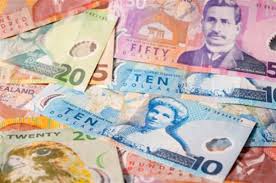Australia, NZ dollars end week on soft note as risk aversion returns

The Australian and New Zealand dollars nursed losses against the yen on Friday, having fallen sharply overnight as a flare-up in geopolitical tensions saw investors switch into the safe-haven Japanese currency.
The Aussie bought 94.84 yen, after falling as far as 94.36, a low not seen in over a month. Its New Zealand counterpart plumbed a one-month low of 87.46 yen, before edging back to 87.86.
Traders said there has been a bit of buying at the lows in Asia, but they suspect sellers will return when London opens.
The downing of a Malaysian airliner in eastern Ukraine, coupled with the launch of a Gaza ground campaign by Israel have weighed heavily on risk sentiment.
“If either situation were to escalate further, it could lead to a continued unwinding of long positions in the AUD and NZD,” said David de Ferranti, analyst at FXCM in Sydney.
“However, we have witnessed several of these geopolitical shocks over the past several months, which ultimately have failed to leave a lasting impact on sentiment. When the dust settles from the latest flare-up, traders could again be tempted to return to the Aussie.”
The rush to safety pushed Australian government bond yields to fresh multi-month lows.
The 10-year bond yield dropped to a 13-month low of 3.329 per cent, from 3.416 per cent. The three-year yield fell to an 11-month low of 2.514 per cent, from 2.588 per cent.
Australian bond futures rallied, driving the 3-year contract to an 11-month high of 97.540, while the 10-year contract scaled a 13-month peak of 96.695.
The Australian Treasury sold A$1.5 billion of 2019 bonds amid strong demand on Friday with the issue 2.6 times oversubscribed at a weighted average yield of 2.8736 per cent.
New Zealand government bonds were also well bid, pushing yields as much as 7.5 basis points lower at the long end of the curve. The 10-year yield hit a six-week low of 4.31 per cent.
Against the greenback, the Aussie was at little changed at $0.9360, while the kiwi was subdued at $0.8678 .
Both were lower on the week, with the Aussie down 0.3 per cent so far. Its kiwi peer is looking at a more substantial drop of 1.6 per cent.
A soft reading for New Zealand inflation and a sharp fall in prices for global dairy products, the country’s biggest export earner, have dogged the kiwi.
While the Reserve Bank of New Zealand is still widely expected to lift rates by 25 basis points to a 5-1/2 year high of 3.5 per cent next week, kiwi bulls are wary a pause in its monetary tightening cycle may follow.
Initial support for the kiwi was seen at $0.8666, the 38.2 per cent retracement of its June-July rally, while additional support lay at $0.8652, its 55-day moving average.
Source: economictimes



























